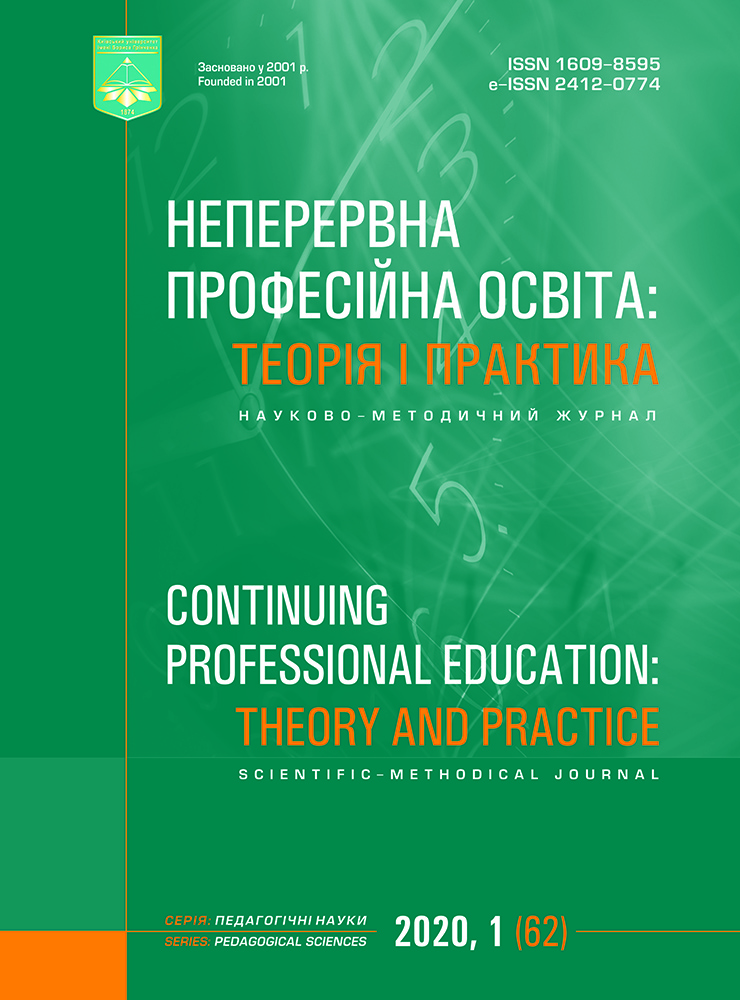FOREIGN EXPERIENCE OF PROFESSIONAL TRAINING OF THE FUTURE MUSIC TEACHERS
DOI:
https://doi.org/10.28925/1609-8595.2020.1.11Keywords:
experience of professional training, music education abroad, structure of music education, teacher of music art, types of music activityAbstract
The article deals with the comparative analysis of the system of music training of pedagogues-musicians abroad (in the countries of the European Union, Scandinavian countries, United States of America, People’s Republic of China and Japan) in particular, comparing these systems and selecting the most valuable experience for implementation in Ukraine. Particular attention is paid to the structure of music teacher education in Poland, Latvia, Finland, Germany, Hungary, Austria, Czech Republic, Slovak Republic, Sweden, Iceland, Norway, Great Britain, America, People’s Republic of China, Japan. The author of the article analyses the term of education in different countries; duration of stage education (Bachelor (Bc), Master (Mg), Doctor (Dr)); duration of study of the course; types of music activity; basic subjects; direction of educational subjects; music-pedagogical systems of outstanding musicians-pedagogues involved in the professional education process. It is analyzed that the common features for music education are: the orientation of education to the inner values associated with the development of musical skills, knowledge and abilities necessary for creativity and reaction to music; understanding and knowledge of the cultural environment and heritage; personal and community development through creativity, identity formation, personal development and social interaction. Music education systems abroad are characterized by the focus on the harmonious development of the personality, provide various forms of creative music playing on the material of folk, classical, contemporary music in their parallel comparison, develop perception and musical hearing through effective techniques.References
Braynin, V., & Noymann, R. (2007). Muzyikalno-pedagogicheskoe obrazovanie v Germanii i Bolonskiy protsess [Music-Pedagogical Education in Germany and the Bologna process]. Muzyika v shkole, 3, 11–16. http://www. brainin.org/Method/Bologna_and_Germany.pdf.
Apraksina, O. A. (1990). Miz istorii muzykal’nogo vospitaniya [From the history of musical education]. Prosveshenie.
Kushka, Ja. S. (2003). Metodyka muzychnogho vykhovannja ditej: navchaljno-metodychnyj posibnyk dlja studentiv vyshhykh muzychnykh navchaljnykh zakladiv 1–2 rivniv akredytaciji [Methods of musical education of children: educational-methodical manual for students of higher educational institutions of 1–2 levels of accreditation]. TIRAS.
Muzychna osvita u SShA [Music Education in USA] 2. 014. http://mus.art.co.ua/kak-y-hde-poluchyt-muzyikalnoe-obrazovanye-za-rubezhom/.
Mukasheva, A. (2014). Organizatsiya vyisshego muzyikalnogo obrazovaniya v Chehii, Bolgarii i Avtrii: sravnitelnyiy aspekt [Organization of Higher Musical Education in the Czech Republic, Bulgaria and Austria: A Comparative Aspect]. Vestnik KazNU. Seriya «Pedagogicheskie nauki», 1 (41), 119–126.
Ovcharenko, N. (2016). Profesijna pidghotovka majbutnjogho uchytelja muzychnogho mystectva do vokaljno-pedaghoghichnoji dijaljnosti: zakonomirnosti i pryncypy [Professional Training of the Future Music Art Teacher for Vocal-Pedagogical Activity: Regularities and Principles]. Neperervna profesijna osvita: teorija i praktyka, 3–4 (48–49), 12–16. http://dx.doi.org/10.28925/1609-8595.2016(3-4)1217.
Plyasova, M. V. Kratkiy sravnitelnyiy analiz rossiyskoy i norvezhskoy sistemyi muzyikalnogo obrazovaniya i vospitaniya [Brief Comparative Analysis of the Russian and Norwegian Music Education Systems and Education]. https://www.marinapliassova.com/Komparativ%20Artikkel%20til%20web%20russ.rtf.
Surkina, A. Sravnenie sistem dopolnitelnogo obrazovaniya v sfere muzyikalnogo iskusstva stran Severnoy Evropyi i Rossii: formyi, tseli, zadachi [Comparison of Additional Education Systems in the Field of Music Art of the Countries of Northern Europe and Russia: Forms, Goals, Objectives.]. http://kdc.yanao.ru/anocti/izdaniyadoklady?download =281:surkin Tszin, Lyu. (2017). Osobennosti modernizatsii professionalnoy podgotovki uchitelya muzyiki v Kitae [Features of Modernization of Professional Training of the Music Teacher in China]. Vesti BGPU, Seriya 1, 2, 27–31.
Аkademi Åbo. https://www.abo.fi/.
Akademi Sibelius. https://www.uniarts.fi/sibelius-akatemia.
Akademia Muzyczna im.Stanisława Moniuszki w Gdansku. http://www.amuz.gda.pl.
A web site analysis of music teacher education in Europ.e https://publishup.uni-potsdam.de/opus4-ubp/frontdoor/ deliver/index/docId/39918/file/psm04_S39-58.pdf.
Declaration on music education. https://www.emc-imc.org/cultural-policy/declaration-on-music-education/ bonn-declaration/.
De Vugt, A. European perspectives on music education. https://publishup.uni-potsdam.de/files/39918/psm04_ S39-58.pdf.
Emergency safeguarding of the Syrian cultural heritage. 2007. http://www.unesco.org/new/fileadmin/ MULTIMEDIA/HQ/CLT/pdf?BonnDeclaration_EП.pdf.
Jāzepa Vitola Latvijas mūzikas akadēmija. https://www.jvlma.lv/.
Latvijas Universitāte. https://www.lu.lv/.
Musikhögskolan i Malmö. https://www.mhm.lu.se/ https://www.ukf.sk/.
Stockholms universitet. https://www.su.se/.
Umeå Universitet. https://www.umu.se/.
Unawersytet Muzyczny Fryderyka Chopina. http://www.chopin.edu.pl/pl/.
University of Helsinki. https://www.helsinki.fi/en.
Downloads
Published
How to Cite
Issue
Section
License
Copyright (c) 2020 Marina Mykhaskovа

This work is licensed under a Creative Commons Attribution-NonCommercial 3.0 Unported License.



